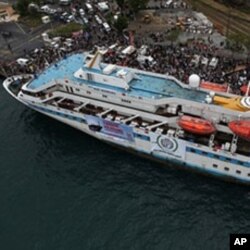U.S. President Barack Obama says tensions over Israel's three-year blockade of the Gaza Strip are unsustainable and that a better approach is needed. Mr. Obama discussed the situation on Wednesday at the White House with Palestinian President Mahmoud Abbas.
After meeting with Mr. Abbas, President Obama did not join international calls for Israel to end the blockade.
But he told reporters that there should be a "better framework" to keep weapons out of the hands of the militant group Hamas that rules Gaza.
"The status quo that we have is one that is inherently unstable. And I think the Israelis have come to recognize that," said the president.
Mr. Obama hosted the Palestinian leader nine days after Israel raided an aid flotilla that was sent to break the blockade in the Mediterranean Sea.
Nine men in the flotilla were killed - eight of them were Turks and one was a Turkish-American.
After meeting with Mr. Abbas, President Obama said he is talking with European partners, Egypt, Israel and the Palestinians about a better approach to the blockade that would address Israel's security concerns and the needs of people in Gaza.
"It seems to us that there should be ways of focusing narrowly on arms shipments, rather than focusing in a blanket way on stopping everything and then, in a piecemeal way, allowing things into Gaza," said Mr. Obama.
Mr. Abbas urged Israel to lift what he called its "siege of the Palestinian people."
While Israel plans to conduct its own investigation of the May 31 convoy incident, President Obama said he joins other world leaders in calling for a credible international probe.
"I think everybody - people in Israel, people in Turkey, people within the Palestinian territories, certainly people here in the United States - want to know the facts of this tragedy: What led to it, how can we prevent it in the future?" He asked.
The meeting between Presidents Obama and Abbas at the White House was scheduled before the Israeli raid, for the purpose of finding ways to advance the Middle East peace process.
Mr. Obama said he foresaw "real progress" in the coming months in U.S. attempts to move Israel and the Palestinians toward direct peace negotiations.
For the past month, Israel and the Palestinians have been talking to each other indirectly, through U.S. envoy George Mitchell. Four months have been allotted for the so-called "proximity talks," which are intended to lead to direct negotiations between the two sides.
The Palestinians have expressed concerns about the proximity talks. Mr. Abbas said he wants to see those discussions succeed.
"We are not saying that we have conditions. What has happened is that we agreed that should progress be achieved, then we would move on to direct talks," said the Palestinian president.
Mr. Obama reassured the Palestinian leader that the United States is fully committed to working side-by-side with both parties in the peace effort.
The president also announced that the United States will send $400 million in civilian aid to the Palestinians. The money is to go toward housing, school construction, clean water and business development.
He praised President's Abbas' efforts to strengthen security and improve the economic situation for his people.
Mr. Obama said the only way to solve the region's long-term problems is to ensure that a Palestinian state exists side-by-side with a secure Israel.
Related video report by Elizabeth Lee:




